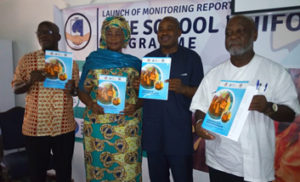Send Ghana launches monitoring report on free school uniforms
 SEND Ghana, in affiliation with Global Partnership for Social Accountability, on Wednesday launched its monitoring report on the free school uniforms programme on the theme: “making the budget work for Ghana,” in Accra.
SEND Ghana, in affiliation with Global Partnership for Social Accountability, on Wednesday launched its monitoring report on the free school uniforms programme on the theme: “making the budget work for Ghana,” in Accra.
The report, dubbed ‘maximizing social protection in Education: The Free School Uniform Programme in Perspective” is the first study of SEND Ghana on the programme to assess the state of realization of its major objectives.
Mrs Harriet Nuamah Agyemang, Senior Programme Officer, SEND Ghana, said the report which was conducted within two and half years focused on social protection intervention specifically focusing on the free school uniforms initiative.
She said the initiative was a pro-poor project started in September 2009, to be implemented in basic schools in deprived areas.
It was also to reduce the cost of education on parents, increase enrolment in schools, and boost the local manufacturing industry.
She said the focus of the report was to assess the state of realization of the programme objectives, which was reducing the cost of education for children to go to school and creating employment in the country by working with the local fabric companies and seamstresses in Ghana.
She added that the study was commissioned in July 2016 with the aim of tracking funds allocated and disbursed to the programme from 2009 to 2015, to assess compliance with the programme procurement procedures and guidelines for the selection of beneficiary.
Mrs Nuamah Agyemang said out of 90 schools across 30 districts, 61 out of the 90 school provided data for the study.
She said According to the report from Ghana Education Service (GES), out of 2.3 million uniforms distributed, 23.6 per cent was distributed to the four regions in which the survey was conducted between 2009 to 2015 academic year.
“Greater Accra and upper West received 64,178 uniforms representing approximately 2.7 per cent, the Northern Region with the highest of 268,318 uniforms representing approximately 11.2 per cent with Upper East having 174,500 uniforms approximately 7.3 per cent.”
Mrs Nuamah Agyemang said according to the findings, they realized that the most deprived region was the Upper West Region and it was recorded that they, had the least of beneficiaries with the Northern Region having the highest.
She also said the findings showed that GES Criteria for selecting schools was “deprivation”.
She also noted that there was inconsistency in the budget allocation, saying that in the 2016 budget, the exact amount government devoted for the programme was not stated, however from the presentation from the Ministry of Finance, during a national consultations meeting to collate citizens input into the 2016 budget, an amount of GH¢5 million was aligned to the District Assemblies Common Fund as allocation for the intervention for 2016 fiscal year.
She said the GES could not indicate how much they were allocated, received or spent on the intervention since its inception, making it nearly impossible to track funds disbursed so far.
The Senior Programmes Officer, said in order to improve on the free uniform programme and the educational sector as a whole, they should go back and take a closer look at the objective of the initiative, bring back local textile players and dress makers on board to improve the sector.
She said “we believe that, with government responsiveness to these demand, it will help realize the full potential of the programme.
Professor Kwame Karikari, in launching the report, commended SEND Ghana for the efforts put in, in completing this report, saying it is in the right direction that they would monitor government programmes to ensure accountability.
He said “the report is a way of ensuring transparency and for citizens to benefit from initiatives that are implemented in their names, as well as assess the challenges in government intervention”.
He appealed to government to take the report serious, devoid of political bias in order to improve the programme in the coming years.
Mr. Siaka Stevens, Member of Parliament for Jaman North commended SEND Ghana for a good job done, saying the findings from the report has enriched him and would help him to deliver well in his field.
He said his worry was as to whether the distribution of the uniforms to the beneficiary was going to be sustainable or continuous; adding that government together with stakeholders would deliberate on the issue and see how possible to solve that.
Source:GNA
